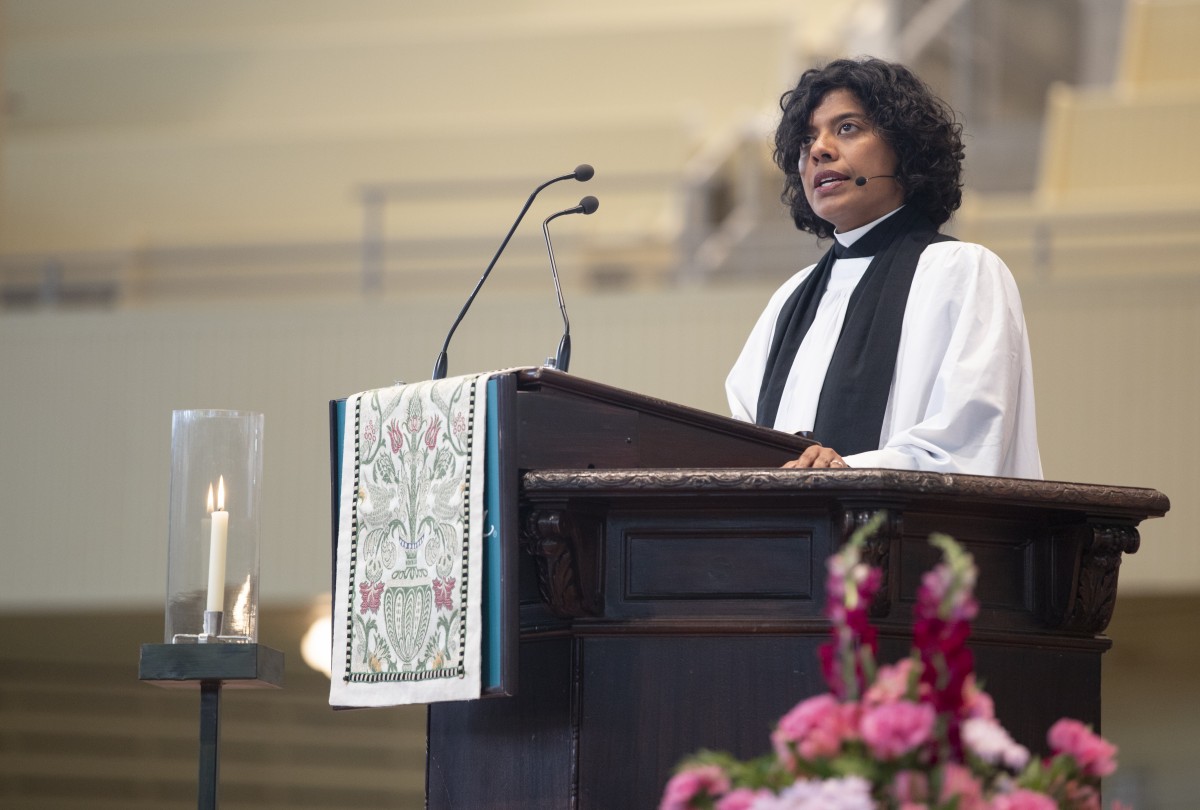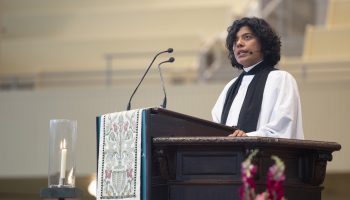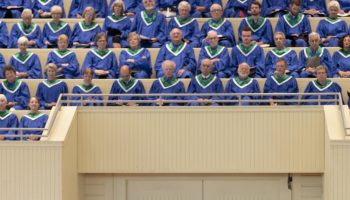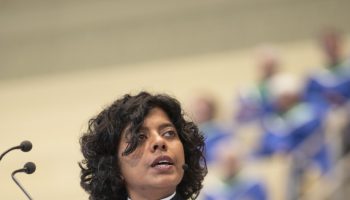This week, I am seeking hope, putting story next to story in order to understand something new,” said the Rev. Winnie Varghese at the 10:45 a.m. Sunday morning worship service in the Amphitheater on Aug. 19.
Her sermon title was “My Soul Cries Out,” and the Scripture text was Luke 1:26-38, the appearance to Mary of the angel Gabriel.
Varghese assured the congregation that this was not a Christmas sermon, but a chance to look at two women (Mary and Elizabeth) without hurrying by them.
The name Mary comes from the Hebrew “Mara,” meaning bitter.
“It is the most popular name among English speakers,” she said.
She asked what the name said about a woman who is described as pondering, finding favor with God, overshadowed, who has seen miracles.
Compassion is needed in order to understand something new.
“The reign of God’s justice has always existed, and it waits for us to see it,” she said.
Varghese told the congregation that we are at a crossroads, the biggest crossroads since the beginning of the country.
“Some people are able to run after possibility, while others are stuck at the crossroads,” she said. “We keep coming back because of slavery, genocide and racism.”
Those who are able to run are tied to the crossroads by an elastic band that keeps pulling them back, she said.
“The crossroads keeps bringing them back until all can go together,” she said.
We have been here before, she told the congregation, and those who look for freedom are being dragged back and are waiting.
“This generation will be heard,” Varghese said, “and we will place our stories next to Mary’s. We move together or not at all.”
Mary asked Gabriel how could it be that she would have a child. She knew who she was and asked how it could be.
In the present day, we ask “How can it be that we stand with so much hate?” Varghese said.
“If hate is too strong, how about fear, terror or hurt?” she said. “If hate is not too strong, we have torn up civility.”
These was something else before, she said, but the hate in Charlottesville and the despair in Ferguson, the building of obsolete pipelines for trash oil, agonized parents who have crossed borders only to be separated from their children, appeals to the Constitution called weak and closed, nativist minds, lead people to ask how can it be.
“Do we look back to memory or forward to dream?” she said. “Can something new be born? How can it be when it has never happened before?”
Our task, she told the congregation, is to look at bodies like Mary’s, to look at the God-bearers among us.
People ignore Mary altogether or make her a vessel of mind and spirit — or even deify her. If we deify her, Varghese said, she is something other than a woman.
Varghese said she often read about Mary as a sidebar to other theological reading. She started to read about the goddess traditions and began to wonder about Mary.
“Men wrote about her, but rarely used her words,” Varghese said. “There are more of her words in the Quran, and very little in the Gospels.”
Women appear in the Christmas and Easter readings.
“We hear about them at the crucial moments of birth and resurrection, but we pass by them quickly,” Varghese said. “When people only come to worship once or twice a year, we move to other texts thinking that is what they want to hear.”
Varghese urged the congregation to slow down and read the Biblical texts, especially the Gospel of Luke, where women are “in the beginning, end and engaged throughout.”
In the Western church, Mary is called the “Blessed Virgin,” the “Ever-blessed Virgin” or “The EBVM, really,” Varghese said.
In other church traditions, she is called “Mother Mary” or “our mother.”
Varghese changed the wording of a prayer to say “the woman Mary” at the beginning of the #MeToo movement. She had done word changes in the liturgy in other congregations.
“It helped people recall their own stories of powerlessness and abuse. Some people responded with tears and some not,” she said.
One man became really angry when Varghese called Mary a woman.
Varghese grew up thinking that the church liturgy had nothing to do with her physical self. She remembered the first time she heard a new form of the liturgy.
“I knew this church stuff had to do with my father, who sat at the end of the pew and is a nice guy,” she said.
Hearing the liturgy in words not exclusively male “shifts how you see the world and who you are,” she said.
Mary was a woman, according to the text. Gender is critical, Varghese said.
“Mary is a woman, and that she is highly exalted is a key to liberation in Luke’s gospel,” Varghese said.
In Varghese’s mother’s hometown in India, there is a temple and a church next to each other. In the temple, the goddesses are referred to as sisters of the people.
Every year, there is a festival for the nativity of Mary in the town. Ten thousand women pray for women, their families, and for healing.
“The order of the world is turned upside down,” she said. “A priest tried to deny my mother communion. Guess who won?”
The festival is a vision of the reign of God, where everyone stands as equals in front of Mary.
At the end, a veil is lifted off the image of Mary wearing a sari and carrying a curly haired Jesus, who looks like an Indian child.
Then, Varghese said, “the world goes back to normal and patriarchy rules.”
“I want to stand in that upside-down moment,” she said. “Listen for what goes past quickly. Put yourself in the story and be present at the beginning. See truth so great that the soul cries out.”
The Rt. Rev. V. Gene Robinson, vice president of religion and senior pastor at Chautauqua, presided. The Rev. Susan McKee, a United Church of Christ minister and founder of Knitting4Peace, read the Scripture. “Be With Me Lord” by Marty Haugen was the Responsorial Psalm 91. The hymn-anthem was “Splendor and Honor,” text by Carl P. Daw, music by K. Lee Scott, setting by Michael Burkhardt. The response to the morning prayers, sung by the Chautauqua Choir, was “Be Still, My Soul,” words by William Dalrymple Maclagan and music by Percy William Whitlock. The offertory anthem, sung by the Chautauqua Choir, was “Surely the Lord is in This Place,” text selected by the Rev. Canon Edward N. West and music by Norman Coke-Jephcott. The organ postlude, performed by Jared Jacobsen, organist and coordinator of worship and sacred music, was Toccata en Fa pour Grand Orgue by Jules Grison. The Mr. and Mrs. William Uhler Follansbee Memorial Chaplaincy and the Daney-Holden Chaplaincy Fund provide support for this week’s services.





